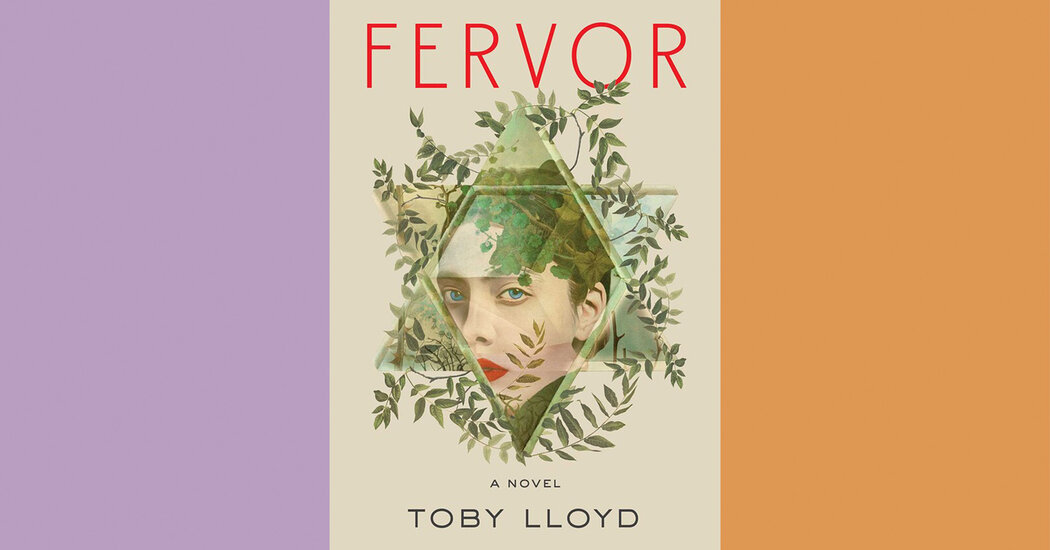FERVOR, by Toby Lloyd
In one of the most perceptive of her late essays, “God’s Language,” Toni Morrison sets out her objective as a novelist: “to construct a work in which religious belief is central to the narrative itself.” How, she asks, can the writer use the language religion has handed us in a way that the 21st-century reader can hear? Not an easy task — but one that Toby Lloyd, in his magnificent, indelible debut novel, “Fervor,” takes on with confidence, and with resounding success.
“Fervor” begins with a relatively straightforward premise: After the death of Yosef Rosenthal, a Holocaust survivor with a numbered tattoo on his arm, the precarious equilibrium of his family is shattered.
But from the hushed grieving at the Rosenthal home outside London, the story lines only multiply and expand. Hannah, Yosef’s daughter-in-law, a provocative Zionist and the family’s overbearing matriarch, writes about Yosef’s concentration camp experiences in a book, which is met with hostility and controversy. Hannah’s daughter, Elsie, who sat at her grandfather’s feet and internalized his life experiences, disappears for days; when she returns, her mother suspects she has become a witch.
Elsie’s brother Tovyah gets into Oxford on his second try, and a substantial portion of the “fervor” of the book’s title arises from his response to the extreme behavior of both his mother and his sister — a break from his “shy, knowledgeable, defensive when provoked, but otherwise largely invisible” nature. His sections are narrated by his closest friend at Oxford, Kate, a secular Jew who serves as a sounding board to Tovyah in sections that bring to mind “Absalom, Absalom!” (but with more generous paragraph breaks).
This might all sound hopelessly complicated. And it might be in the hands of a lesser talent. For a writer as gifted as Lloyd, even potential missteps come to bear fruit. Early sections depicting Yosef’s last days are lyrical and moving; when Tovyah sees his dead grandfather we learn that “he had seen a dead mouse, flattened against the curb with blood pooling round its head, but he’d never seen a dead person.”
In evocations of holy texts from the Book of Judges to the Talmud to the Zohar, Lloyd has a remarkably light touch, bringing across complicated ideas with concision and precision. The esoterica of kabbalah plays a central role throughout the book — as a motivation for Elsie’s strange and possibly supernatural behavior, as the source of a figure “in a loose white kaftan” whom Kate sees and who might be a ghost, and a counterpoint to the way Yosef’s death serves less as a MacGuffin than as the wellspring from which the novel gains depth.
In the final act of “Fervor,” Lloyd orchestrates a meeting of his main characters at the Rosenthals’ house. In scenes that echo the end of Philip Roth’s “American Pastoral,” at a family dinner with everyone present, all the early promise of the novel comes to fruition. No spoilers here, but searching questions about the lasting influence of a Holocaust survivor, the shimmering play between realism and mysticism that the book has engaged with throughout, come to an ending that feels both surprising and inevitable.
Also, biblical. Which puts me back in mind of that Toni Morrison essay. That a young British novelist, on his first try, should have so effectively taken up a gauntlet laid down by the greatest American novelist of an era might seem surprising. But maybe not. We live in an age increasingly defined by the upending of well-established orders. “Fervor,” in its unpacking of a family after the loss of its Holocaust-survivor patriarch, serves as a parable for the loss of a global accord created from the ashes of World War II. The book models the entropy that sets in when we forget why fragile harmonies are fashioned, however imperfectly, out of chaos. Enriching his story with detail and above all heart, Lloyd has crafted a lasting allegory of our dark historical time.
FERVOR | By Toby Lloyd | Avid Reader Press | 276 pp. | $28


